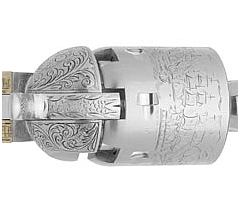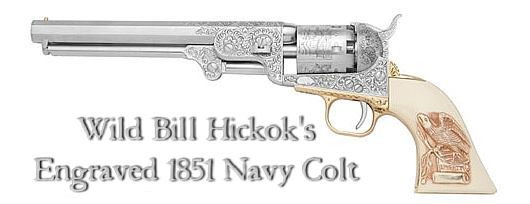Wild Bill Hickok's Custom Engraved 1851 Navy Colts, and the story of the Famous Gunman.

James Butler "Wild Bill" Hickok's
favorite sidearms were a pair of elegantly engraved, ivory-handled 1851
Navy Colt cap and ball .36 caliber revolvers similar to the one
pictured here.
The cylinders of his Colts were engraved with a
naval battle scene
between Texas and Mexico. He carried them in butt-forward, open-topped
holsters that allowed him to draw the Colts underhanded and spin them
forward (called the reverse or "plains" draw), or with a cross-handed
draw.
He must have been an arresting sight, wearing that
two-holster rig with
the ivory-handled Colts, a long frock coat and wide-brimmed hat. Over
six feet tall, he was broad shouldered, with a ginger-colored moustache
and flowing blonde hair.
Unlike many lawmen and gunmen of the Old West who
gained most of their
fame long after their time on earth was past, Hickok was legendary as
the fastest and most deadly gunman in the West during his own
lifetime.
The numbers may have been exaggerated, but his status as a fast and deadly plains gunman apparently were not. Many, many accounts from credible eyewitnesses, including General George Custer, spoke of his speed and skill with the Navy Colt revolvers he favored. It was said he could draw and fire with blinding speed, and without ever appearing to aim, unerringly hit his target.
Given his legendary skills, it's fortunate that he favored enforcing the law over breaking it. In 1855 at the age of 18, he was constable of Monticello Township in the Kansas Territory. For a time he was a freight driver for Russell, Waddell and Majors--partners in a large freight company hauling supplies to western army outposts--who a few years later started a little enterprise they called the Pony Express.
During the Civil War, Hickok joined the Union forces, serving mostly in Kansas and Missouri, where he earned a reputation as a highly skilled army scout. The engraved Colts were, in fact, a gift from a Massachusetts Senator in recognition of his scouting services for the Army.
During the war he served with another famous scout--Buffalo Bill Cody--who would become his lifelong friend. Immediately following the war, Hickock served as a U.S. Marshal, and even earned a living as a professional gambler for a time.
Between 1865 and 1871, Hickok served as a lawman in various capacities--mostly in the cow towns of Kansas. He was at one time or another a City Marshal, Deputy Marshal, Sheriff and U.S. Marshal.
His lightening-quick reflexes kept him alive when he got into any number of dangerous scrapes, but they finally betrayed him in 1871. While serving as marshal of Abilene, Kansas in 1871, he was facing down a large crowd of drunken street brawlers when out of the corner of his eye, he caught sight of someone running toward him. Firing two shots in rapid succession in the direction of the motion, he shot and fatally wounded Abilene Deputy Marshal Mike Williams who had been running toward Hickok to come to his aid. Hickock was removed from his position as marshal two months later. Haunted by his killing of the deputy for the rest of his life, he never worked as a lawman again.

Buffalo Bill,
who had become a showman of great renown, invited Hickock to join the
cast of his new play, "Scouts of the Plains" in 1873. Unfortunately,
"Wild Bill" proved much less adept at stage play than he was at gun
play, and his show business career was mercifully brief.
In 1876, in poor health with his eyesight failing,
Hickok retreated to
Deadwood, a wild and lawless mining camp in the Black Hills of the
Dakota Territory, to drink and play poker. On the night of August 2nd,
he entered Saloon Number Ten looking for a poker game. It was his habit
to find a chair in the corner facing the door, to protect himself
against attack from behind. But the saloon was crowded that night and
no corner chairs were open. No one is sure why he went against his own
inherent caution and took that chair with his back to the door, but it
was a decision that proved fatal. He was shot in the back of the head
by Jack McCall, who would eventually hang for his murder.
Legend has it that he was holding a pair of aces and
a pair of eights,
and his fifth card had yet to be dealt when the fatal shot was fired.
That combination of cards has been called the "dead man's hand" ever
since.
Firearm Type: "Cap and Ball" Percussion
Revolver (Personlized)
Nation Of Manufacture: USA
Military Service Dates : 1851-1870
Variations: 1851 Navy, Army Colt, Wild
Bill's engraved Navy Colt
Ammunition: .36 Cal. Ball
Wars: US Civil War
Recent Prices at Auction for Originals:
Priceless, Irreplaceable
Interested in an authentic re
plica of Wild
Bill's 1851 Engraved Navy Colt
?
Call Us Toll Free in the US and Canada: 1-800-258-5167